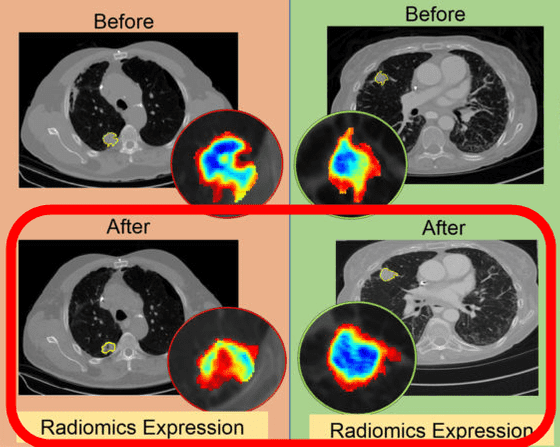It is possible to distinguish between `` people who are effective against cancer immunotherapy '' and those who are not effective using AI

by
Cancer and malignant tumor diagnosis technologies using AI are constantly evolving, and breast cancer , lung cancer , brain tumors, etc. are already being detected with higher accuracy than humans. In the meantime, technology has been developed that enables AI to determine the effects of cancer treatment at an early stage.
Changes in CT radiomic features associated with lymphocyte distribution predict overall survival and response to immunotherapy in non-small cell lung cancer | Cancer Immunology Research
https://cancerimmunolres.aacrjournals.org/content/early/2019/11/12/2326-6066.CIR-19-0476
Using Artificial Intelligence to determine whether immunotherapy is working The Daily
https://thedaily.case.edu/using-artificial-intelligence-to-determine-whether-immunotherapy-is-working/

Unlike
Therefore, Anant Madabhushi and his team, who are studying biomedical engineering at Case Western Reserve University, confirm the effects of immunotherapy by using AI to capture changes in cancer cell tissue. Developed technology. Specifically, AI was calculated using CT scan data from a total of 139 patients with non-small cell lung cancer treated at two medical institutions and data from the results of a solid cancer treatment effect assessment (RECIST). He was able to train and judge the outcome of treatment from changes in cancer tissue.
The following images are CT scan images of patients who did not respond (left) and patients who responded (right) after receiving an immunotherapy treatment called an immune checkpoint inhibitor . If you look at the CT scan results after treatment surrounded by a red frame, it seems that the ineffective patient seems to be shrinking the cancer tissue, so confirm the effect of treatment from the CT scan results You can see how difficult it is. On the other hand, with the AI developed by Madabhushi et al., It was possible to accurately determine the suitability of immunotherapy from the treatment results after 2 to 3 cycles.

“For example, if a blood vessel in a tumor is destroyed, it may appear that the tumor has grown despite the effectiveness of treatment.” Mohammadhadi Khorrami, co-author of the paper In addition, it is difficult to judge the effect of treatment simply by viewing the size of the tissue from the CT scan image, but the change in the tissue that can be seen from the CT scan data is a good indicator of whether the treatment is successful. '
“Immunotherapy has transformed the ecosystem surrounding cancer, but it is still very expensive. This has become a financial toxic and has afflicted cancer patients, who have been diagnosed with cancer. , 42% of those who lost their savings within a year, ”he pointed out. The results of this study are expected to bring light to cancer patients from an economic perspective. Showed.
Related Posts:







